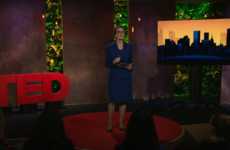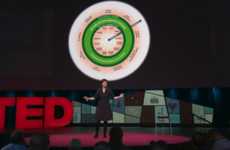
Need Inspiration?
Get inspired by 4,000+ keynote speaker videos & our founder, a top keynote speaker on innovation.
Melanie Nezer's Talk on Seeking Asylum is Sobering and Honest
Kalin Ned — July 24, 2019 — Keynote Trends
The talk on seeking asylum by Melanie Nezer — a refugee and immigrant rights attorney who works for HIAS, embraces a conversation that is much needed.
The keynote is about the United State's response to the refugee crisis. Nezer looks at the issue from two sides of the coin. On one hand, people who flee countries like Guatemala, El Salvador or Seria, do so out of necessity. These spaces are ravaged by violence — from Civil War to gender inequality. Questions from this side include how to keep one's children safe, for example. On the other hand, it is easy for people that occupy the safety destination "to think in terms of absolutes" — if it is legal or illegal. Bringing this to light, Melanie Nezer's talk on seeking asylum holds that the act of immigrating because of a violent issue is "a fundamental right in our own laws and in international law."
To support her case about how the United States has fostered a level of unjust intolerance for refuges, the speaker brings up statistics. Moreover, this is extremely important as there has been a spike in families at checkpoints looking to enter the safety destination. It appears that in 2018, fewer refugees were resettled in the United States since the US Refugee Admissions Program was established in 1980. While during the culmination of the Syrian crisis three years ago, about 15,000 people were resettled, the number last year was 62. Meanwhile, over 3,000 children were detained and billions were spent to do so. Nezer also points out some illegal practices on part of border guards who tell people that "the country is full," ultimately denying a very real right.
During her talk on seeking asylum, the advocate outlines a few pathways to negating these facts. For one, she calls for dialing back the toxic rhetoric. Secondly, she calls for global cooperation and an increased focus on humanitarian aid. Despite the sobering statistics, Melanie Nezer is hopeful. After all, "support for refugees and immigrants in this country," from the side of the public, "has never been higher."
The keynote is about the United State's response to the refugee crisis. Nezer looks at the issue from two sides of the coin. On one hand, people who flee countries like Guatemala, El Salvador or Seria, do so out of necessity. These spaces are ravaged by violence — from Civil War to gender inequality. Questions from this side include how to keep one's children safe, for example. On the other hand, it is easy for people that occupy the safety destination "to think in terms of absolutes" — if it is legal or illegal. Bringing this to light, Melanie Nezer's talk on seeking asylum holds that the act of immigrating because of a violent issue is "a fundamental right in our own laws and in international law."
To support her case about how the United States has fostered a level of unjust intolerance for refuges, the speaker brings up statistics. Moreover, this is extremely important as there has been a spike in families at checkpoints looking to enter the safety destination. It appears that in 2018, fewer refugees were resettled in the United States since the US Refugee Admissions Program was established in 1980. While during the culmination of the Syrian crisis three years ago, about 15,000 people were resettled, the number last year was 62. Meanwhile, over 3,000 children were detained and billions were spent to do so. Nezer also points out some illegal practices on part of border guards who tell people that "the country is full," ultimately denying a very real right.
During her talk on seeking asylum, the advocate outlines a few pathways to negating these facts. For one, she calls for dialing back the toxic rhetoric. Secondly, she calls for global cooperation and an increased focus on humanitarian aid. Despite the sobering statistics, Melanie Nezer is hopeful. After all, "support for refugees and immigrants in this country," from the side of the public, "has never been higher."
2.3
Score
Popularity
Activity
Freshness
















